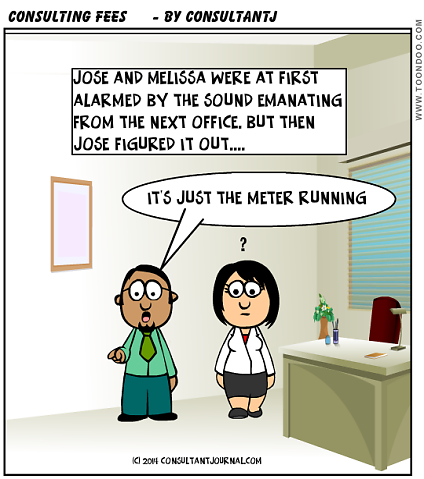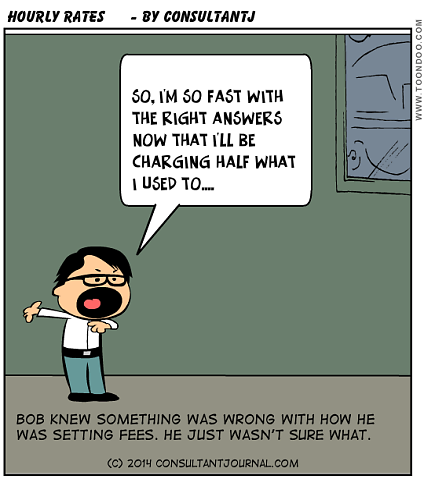
Setting consulting fees comes up throughout the work life of a consultant. It’s not a “set it and forget it” business activity. Reviewing and negotiating fees can puzzle both new and experienced consultants. Setting your consulting rates involves a little art and a little science. And it involves some emotional resolve – knowing what to charge can stump anyone.
Working through the filters around setting consulting fees
Depending on your approach to setting your fees, you may see your rate through certain filters. For some people, having a formula for setting fees gives them confidence. They prefer to see things through a scientific lens, with consideration for costs, overhead and their opportunity cost (the salary they would make at a job). Some people like to have a rule of thumb, such as my suggestion to double or triple their hourly salaried rate. Others like to take a look at market and competitive conditions and adjust accordingly. Still others like to look at the prices of substitutes. There’s a great article on setting your consulting fees on our site and it’s our most popular piece.

What to charge for consulting gets influenced by feelings
Many people, though, get caught up in a bit of emotional overwhelm – part of the stress, good or bad, of being a business owner. That’s because setting consultant fees comes down to more than just a set of calculations. It involves knowing your market, competitors, core competences and the value of your solutions. It involves managing the actions and reactions of prospective clients, clients and competitors. It does no good to simply work through a consulting fees calculator and say, “Hey, there’s my new hourly consultant rate and that’s what I’ll charge!”
Best to move away from hourly consulting fees
While Consultant Journal’s article on setting fees walks you through some models, I don’t actually suggest you stick to an hourly rate or simply price like your competitors do. That’s because charging by the hour is a long-term trap. Really, it makes sense to move to a model where you charge a fee based on the value your solution provides to the client. This Solution-Based Fee pricing approach makes the most sense. Otherwise, as you become more effective at what you do, you’d have to pad your hours to keep up. If you used to make $80 an hour and now you can do the same job in half the time, you’d only make $40. You would then either have to act unethically and charge the client for time you didn’t use or you’d have to get used to making less and less money or serving more clients in less time. That’s not really a recipe for a success – it’s unethical and too difficult to manage. In comparison, Solution-based Fee pricing relies on the value of the solution you offer and gives you the chance to also look at return on investment, opportunity costs, substitutes and downtime that your client would otherwise incur.
Yet hourly consulting rates may work for you
That being said, there’s nothing really wrong with sticking with an hourly rate if that’s where you’re most comfortable. I know I am a bit of a lone wolf in saying that. But the most important thing about setting your fees is that you’re able to negotiate from a place of strength. If you feel the most comfortable charging an hourly rate based on the models in our consulting fees article or those outlined in more detail in my book, Consulting Fees: A Guide for Independent Consultants, you may actually do better in sticking to that hourly rate. That’s because part of being effective in any sales process involves being confident and prepared. So my book on setting consultancy fees goes into detail about managing client objections and the sales process, as well as your own emotional reactions. Your consultancy rate really involves more than sticking some numbers into a calculator and coming up with an answer.
Breaking through emotional roadblocks for fees
Depending on how or where you grew up and what experience you have had in your life, you may have some emotional attachments to money that affect how you price your services or react to clients. Over the years, I have been surprised by how many of the consultants *I* have hired have been timid in being clear about their fees. I’ve sometimes had to ask people outright to tell me their fees, because they’ve been so hesitant about it. This has applied to both men and women and people charging fees that are $15 an hour and people charging several hundred. However, I’ve noticed that people who are confident in their fees, even those who charge an hourly rate, are very clear on the value their solutions provide and they are very clear on their market, competitors and the benefits of working with them. My book on consulting fees goes into detail about how to work through those situations because I have seen for myself the difference it makes. In fact, in my 20 years in marketing, I’ve used a similar approach for all my clients and even employers – at its core, working through consulting fees involves business and marketing planning.

